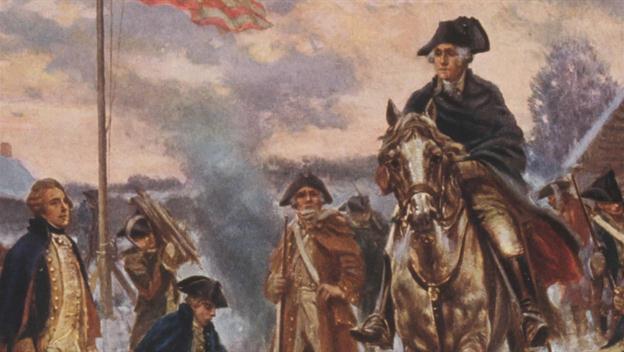Bruce's Beat 9-19-2015
For His Worst Enemy
by Anna Rice
During the Revolutionary War, there was a preacher named Peter Miller who lived in Pennsylvania. Near him lived a man who was violently opposed to Miller and openly abused both him and his followers. The man was also a Tory, loyal to the British Crown during the war. This man was found guilty of treason by the patriots, and sentenced to death. No sooner was the sentence pronounced that Miller set out on foot to General Washington to intercede for his enemy's life. Washington told Miller that the petition for his friend could not be granted. "My friend! He is not my friend, " Miller exclaimed. "I have no worse enemy living than that man."

"What," asked Washington, "you have walked sixty miles to save the life of your enemy? That, in my judgment, puts the matter in a different light. I will grant your petition." The pardon was made out and Miller at once proceeded on foot to the place, fifteen miles distant where the execution was to take place. He arrived just as the man was being led to the scaffold. The traitor, on seeing Miller in the crowd, exclaimed, "Why there is old Peter Miller! He has come all the way to have his revenge gratified today by seeing me hanged." These words were scarcely spoken before Miller stepped forward, produced the pardon, and the life of his worst enemy was spared.
"When we were enemies we were reconciled to God by the death of His Son." - Romans 5:10.
The above story which was published in the Christian Leader in 1937 seems almost too good to be true. But a quick internet search confirms the story, though a few of the details may be different from Sis. Rice's account. I have shared it today because some historians see it as one of the reasons why Washington began exercising a different policy toward his British counterparts. Washington determined that the Americans and the free country for which they were fighting was not going to be like the one ruled by George III.
In a day in which waterboarding and other forms of torture are justified for our enemies, we need to be reminded of Washington's actions. Yes, "war is hell," and military justice is different than civilian courts, but if we become as tyrannic and despotic as our enemies, what have we really gained?
But this also hits a little closer to home. We differ from someone on some issue, sometimes not even doctrinal issues. Now that person must be fought tooth and nail, utilitzing every media outlet at our disposal. Often, ad hominem attacks are made, character is assassinated and reputations ruined. And we justify it, believing truth to be a billy club that permits such actions and attitudes.
In his debates with Baptists, Presbyterians, Roman Catholics and even Atheists, Alexander Campbell never labored to destroy his opponent. "To him a religious debate was entirely different from a fight; it was a quest for truth in which the participants were mutual searchers. Truth to him was more important than personal triumph. After the Campbell-Purcell debated the Catholic prelate considered his opponent the fairest man in debate of whom he could possibly conceive, one who fought always for truth and never for victory." (Bill Humble, Campbell and Controversy, 259).
God's people are to be "speaking the truth in love" - Ephesians 4:15. Paul admonishes, "And the Lord's servant must not be quarrelsome, but kind to everyone, able to teach, patiently enduring evil, correcting his oppoents with gentleness. God may perhaps grant them repentance leading to a knowledge of the truth." - 2 Timothy 2:24-25.
